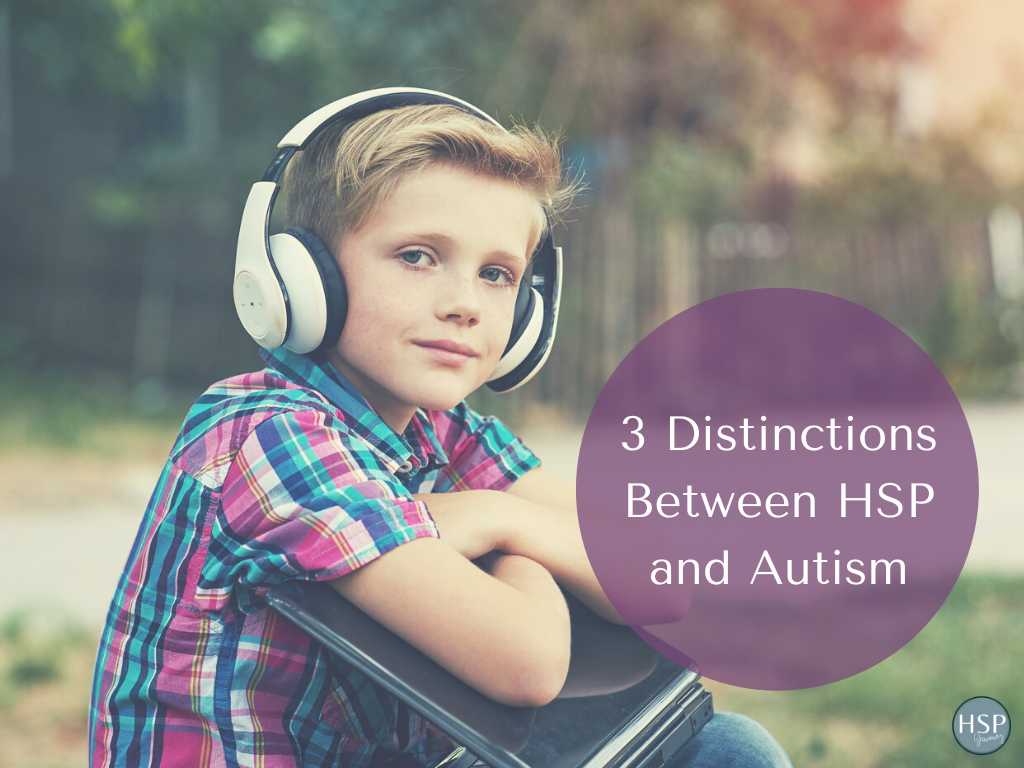As you embark on a journey to understand yourself better as a Highly Sensitive Person (HSP), you may notice some overlap between traits of HSP and autism. In fact, many are unsure if they are a Highly Sensitive Person or if they are autistic, and few resources are available to give a meaningful distinction between the two.

Table of Contents
#1 – HSP and Autism – Condition or Temperament?
Currently, Autism Spectrum Disorder (ASD) is a diagnosable condition in both the DSM-5 and the ICD-10 – that is, the diagnostic manuals that many professionals use in the United States and across the world. Sensory Processing Sensitivity otherwise known as Highly Sensitive Person (HSP), however, is not a condition or disorder, nor is diagnosable. HSP instead is considered a temperament, which is an inborn aspect of a person. This is also distinct from personality which builds upon temperament and can be altered and developed throughout one’s development (Smith et al., 2019).
Interestingly, some of the main researchers in the area of HSP had become more interested in studying the temperament after coming across many people who wanted therapy because they believed they had a disorder even though they did not (Smith et al., 2019). Many understandably came to this conclusion due to some of the aspects of HSP and negative effects that have been reported such as social phobia, avoidant personality disorder, anxiety, depression, perceived stress and ill health, and agoraphobic avoidance (Liss et al., 2008).
Social phobia, anxiety, and depression are high on the list of well-documented co-occurring conditions for autistic people, and stress and ill health aren’t far behind. It is possible that similar mechanisms are at play here; when one experiences the world differently and is overwhelmed much more easily than others, it can become anxiety-inducing and exhausting at the very least.
#2 – HSP and Autism – Sensory Threshold
One of the biggest aspects of HSP is the lowered sensory threshold, in which highly sensitive people pick up on sensory aspects of the environment more easily than others and get overwhelmed by this sensory information. Those with sensory processing disorder (SPD) and autism also get overwhelmed by sensory information or can be more (or less) sensitive to sensory stimuli.
One difference to note here is that those with SPD or ASD have trouble processing sensory information in a way that is organized, leading to both low and high thresholds for different kinds of stimuli depending on the individual and their personal sensory profile and often can result in atypical responses to too much or too little sensory input.
#3 – HSP and Autism – Questionnaires and Tests
Perhaps one of the biggest areas of confusion lies in the attempt to make questionnaires and tests to help people find out if they have ASD or if they are a Highly Sensitive Person, as many times when stated in easily accessible, plain language overlaps heavily.
There is a scale created by researchers called the Highly Sensitive Person Scale (HSPS), one of the more official ways of determining if one is an HSP, which gives questions such as the following: “Are you overwhelmed by sensory input,” “do changes in your life shake you up?” (Rinn et al., 2018, p.170).
These types of questions are also common ways to detect autistic traits. Often, autistic people can become unreasonably upset over even small, minor changes and transitions, and we’ve already gone over the sensory differences very common to autism.
Additionally, many autistic people report avoiding violence in movies or TV shows because they’re too intense or unsettling and have deep and complex thoughts such as are mentioned in other question items that suggest HSP (Scott, 2020).
Since HSP is a temperament, autistic people are capable of also being highly sensitive people. One potential reason HSP-like questions may show up on self-tests for autism could be that many autistic people are HSPs and assumed these qualities were a part of autism rather than temperament. This seems to be the case for some of the tests that have been created by autistic people to help pick up on aspects that generally aren’t talked about with a more medical view of autism. This would explain why many autistic people may not relate to needing to avoid movies depicting violence or feeling emotions very strongly.
Why do highly sensitive people get overwhelmed?
Highly Sensitive People (HSPs) tend to get overwhelmed more easily than others because they process sensory information more deeply and thoroughly. This means that they are more aware of subtle changes in their environment, such as bright lights, loud noises, or strong smells, which can be overwhelming and overstimulating. Additionally, HSPs tend to have a more active emotional response to situations, which can also contribute to feeling overwhelmed. They may feel more deeply affected by negative emotions, such as sadness or anxiety, and may need more time and space to process and recover from these feelings. Overall, being highly sensitive can be both a strength and a challenge, and it is important for HSPs to practice self-care and set boundaries to prevent becoming overwhelmed.
Would you like to better understand yourself and how to manage your sensory overload?
FREE MASTERCLASS:
Sensory Overload &
The Highly Sensitive Person
Four Things All HSPs Have in Common (That Autistic People Don’t)
A list called D.O.E.S., standing for Depth of Processing, Overstimulation, Emotional Responsiveness and Empathy, and Sensitivity to Subtleties, was created by the researcher who spearheaded the concept of HSP, Elaine Aron. This is supposed to be a list of things that all HSPs have in common. While some of these can or do overlap with autistic traits, there are some important discrepancies that can help you differentiate between autism and HSP.
Depth of Processing
HSPs are described as reflecting more than others about the meaning of life, their line of work, etc., being slow at making decisions but often making very good decisions, being known for their good ideas, and having personal insight and a sense of long-term consequences with this often leading to unusual conscientiousness (Aron et al., n.d.). Autistic people are known to require a longer time to make decisions with differences in how they come to conclusions compared to most people and often end up making great decisions. Whether or not autistic people across the board have good personal insight and a sense of long-term consequences is up for debate, however. Many times, it is easier for autistic people to see patterns and thus potential long-term consequences, but this may not necessarily be due to deep insights or understanding of others.
Overstimulation
The section on overstimulation mentions experiencing burnout and a sense of not being able to handle anything more, thinking something is wrong with them for not being able to handle what others seem to, and requiring more sleep and downtime than others. A specific addition to the mention of overstimulation is that when in a gentle environment, an HSP can effectively process and integrate stimuli (Aron et al., n.d.). This is an important distinction between HSP and SPD as well as autism. Autistic people often require more than a gentle environment to recover and still have difficulty processing and integrating sensory stimuli in these environments, while an HSP should be able to integrate and process effectively once in said gentle environment. Other than this distinction, most of this section seems to speak directly to autistic people as well due to sensory sensitivities.
Emotional Responsiveness and Empathy
When it comes to emotional responsiveness and empathy, HSPs are described as people who are more easily and appropriately moved to tears and laughter, react more to the emotions of others, and become distressed by violence, unfairness, injustice, or other disturbing events (Aron et al., n.d.). To be clear, autistic people do have empathy, but it may not always be expressed or appear the same way as it does for many others. Having a more atypical expression of empathy and potentially being less appropriate in their affect (such as laughing or crying) are more likely in autistic people than what is described of HSPs.
Part of autism is having difficulty with social cues and misreading social situations, which is why this may be a more difficult area. However, both HSPs and autistic people may experience higher rates of alexithymia, which is having difficulty knowing or naming one’s own emotions, although HSPs tend to feel others’ emotions (Karaca Dinç et al., 2021).
Sensitive to Subtleties
The last section, sensitive to subtleties, notes that HSPs notice small changes that others miss such as someone looking tired or décor in a room they’ve been in briefly, being more aware of subtle sounds, tastes, and smells, and noticing what needs to be changed in an environment to make others more comfortable (Aron et al., n.d.). While the subtleties connected to sensory aspects can be accounted for in both ASD and HSPs, noticing what needs to be changed in an environment to make others more comfortable is one of the most glaring discrepancies between the two.
Understanding one’s own needs, especially sensory, and knowing when and how to address them to regulate is already quite the battle for autistic people. Many autistic people are not going to know how to make others more comfortable in an environment, even if they notice that they are uncomfortable unless they can relate to that exact same experience in the moment.
What HSP Can’t Explain for Autism
While we see a lot of overlap between autism and HSPs, there are some aspects of HSPs that don’t align well with known aspects of autism. Additionally, many autistic people with lower support needs may wonder if they are overthinking and are only highly sensitive persons without being autistic.
HSP cannot account for the repetitive behaviors (that are practically a hallmark of autism), echolalia, peculiar and specific interests and types of play, misreading social situations, or requiring social scripts to handle social situations. HSPs may have difficulty being around others due to being overwhelmed by them but are not otherwise defined as having difficulties with social understanding.
References
Aron, E., Allen-Williams, B., & Strickland, J. (n.d.). FAQ: Is Sensory Processing (or Integration) Disorder (SPD) the same as Sensory Processing Sensitivity (SPS)? Retrieved January 12, 2022, from https://hsperson.com/faq/spd-vs-sps/
Karaca Dinç, P., Oktay, S., & Durak Batıgün, A. (2021). Mediation role of alexithymia, sensory processing sensitivity and emotional-mental processes between childhood trauma and adult psychopathology: A self-report study. BMC Psychiatry, 21(1), 1–10. https://doi.org/10.1186/s12888-021-03532-4
Liss, M., Mailloux, J., & Erchull, M. J. (2008). The relationships between sensory processing sensitivity, alexithymia, autism, depression, and anxiety. Personality and Individual Differences, 45(3), 255–259. https://doi.org/10.1016/j.paid.2008.04.009
Rinn, A. N., Mullet, D. R., Jett, N., & Nyikos, T. (2018). Sensory Processing Sensitivity Among High-Ability Individuals: A Psychometric Evaluation of the Highly Sensitive Person Scale. Roeper Review, 40(3), 166–175. https://doi.org/10.1080/02783193.2018.1466840
Scott, E. (2020, September 18). Highly Sensitive Person Traits That Create More Stress. Verywell Mind. https://www.verywellmind.com/highly-sensitive-persons-traits-that-create-more-stress-4126393
Smith, H. L., Sriken, J., & Erford, B. T. (2019). Clinical and Research Utility of the Highly Sensitive Person Scale. Journal of Mental Health Counseling, 41(3), 221–241. https://doi.org/10.17744/mehc.41.3.03
Be sensitive, be free
*This post contains affiliate links and I will be compensated if you make a purchase after clicking on my links*





[…] yourself easily affected by loud noises, bright lights, or strong smells, you might relate to the HSP trait. About 1 in 3 people may have this kind of sensitivity, regardless of gender. It is not rare and is […]